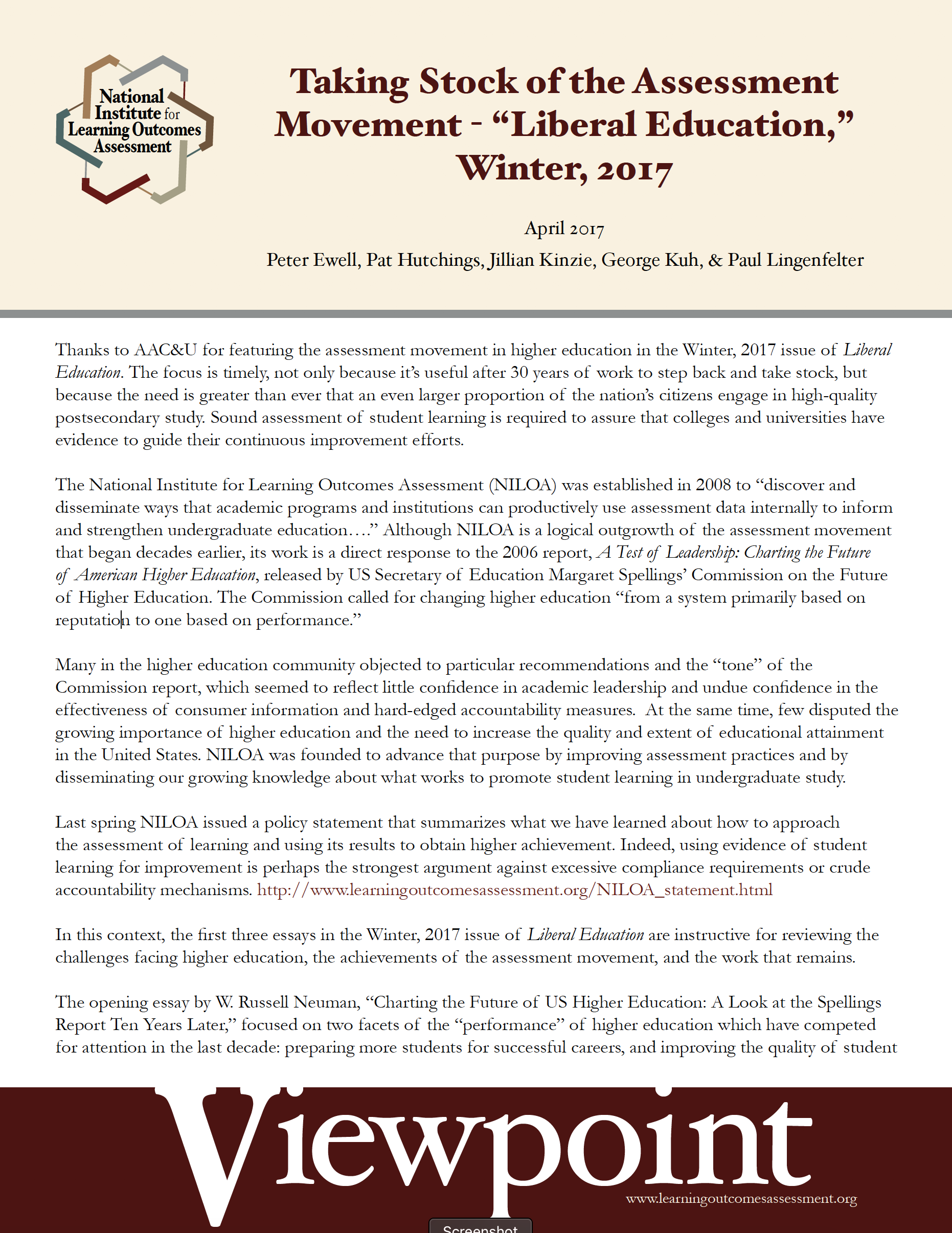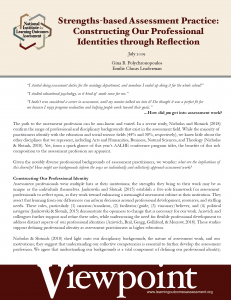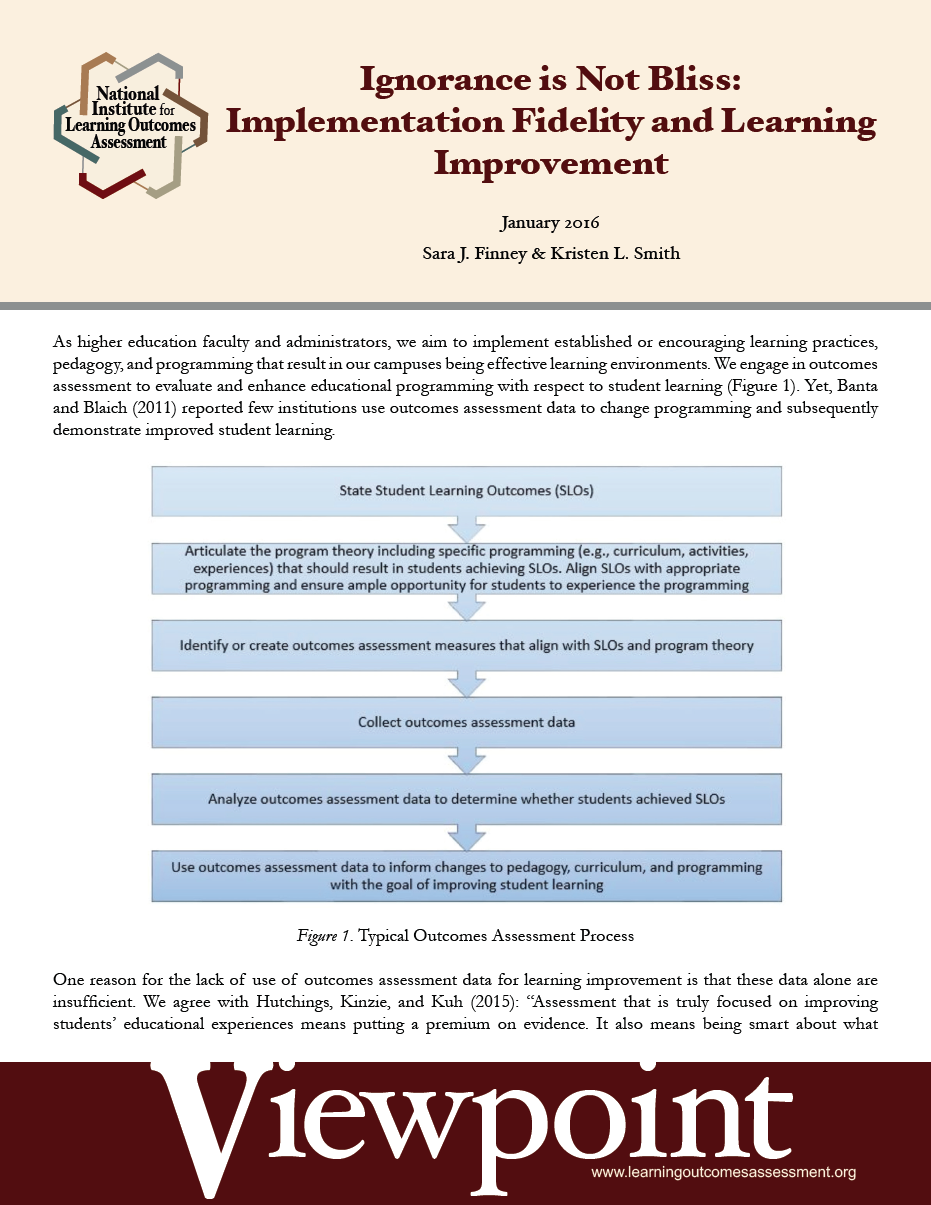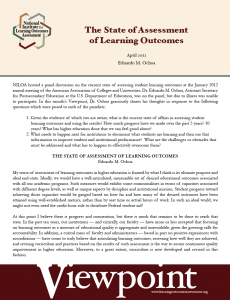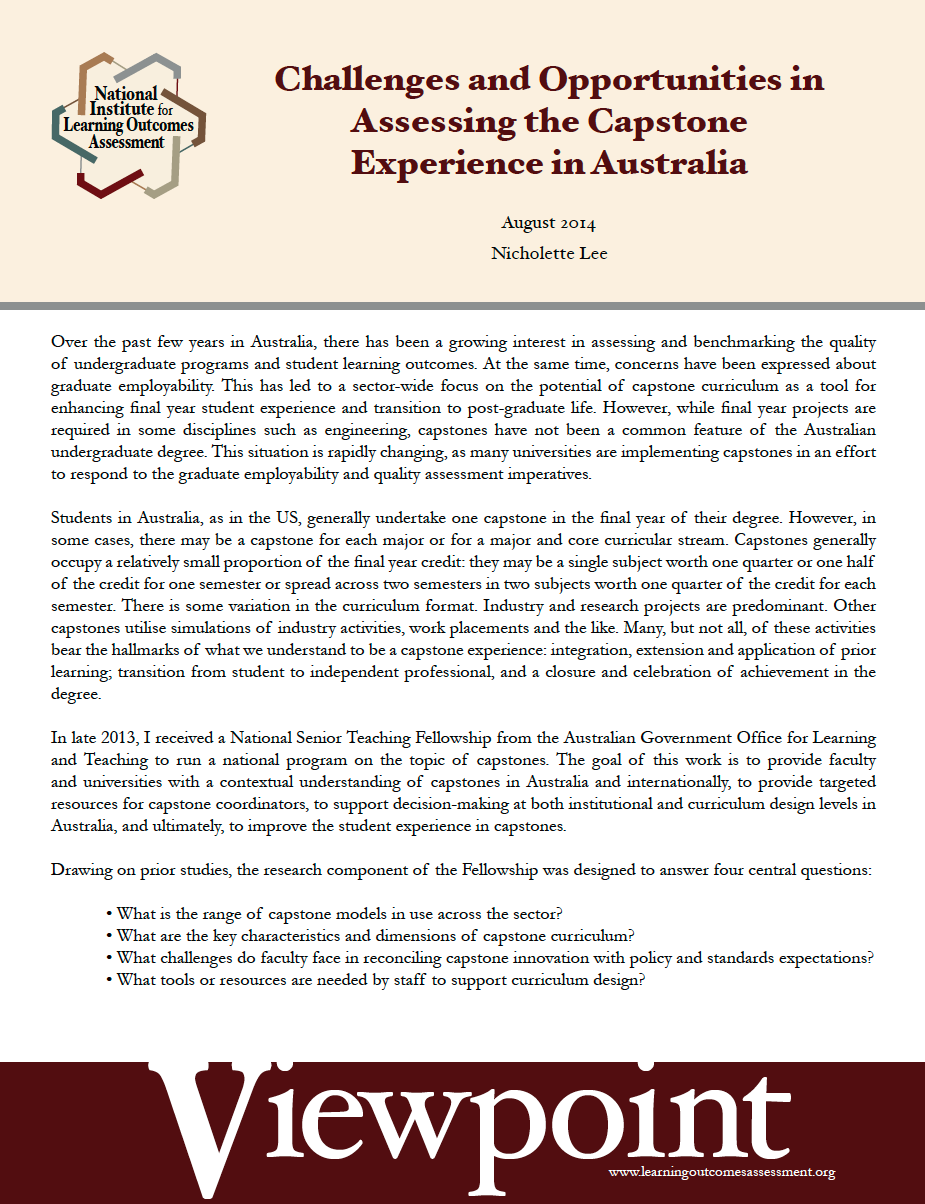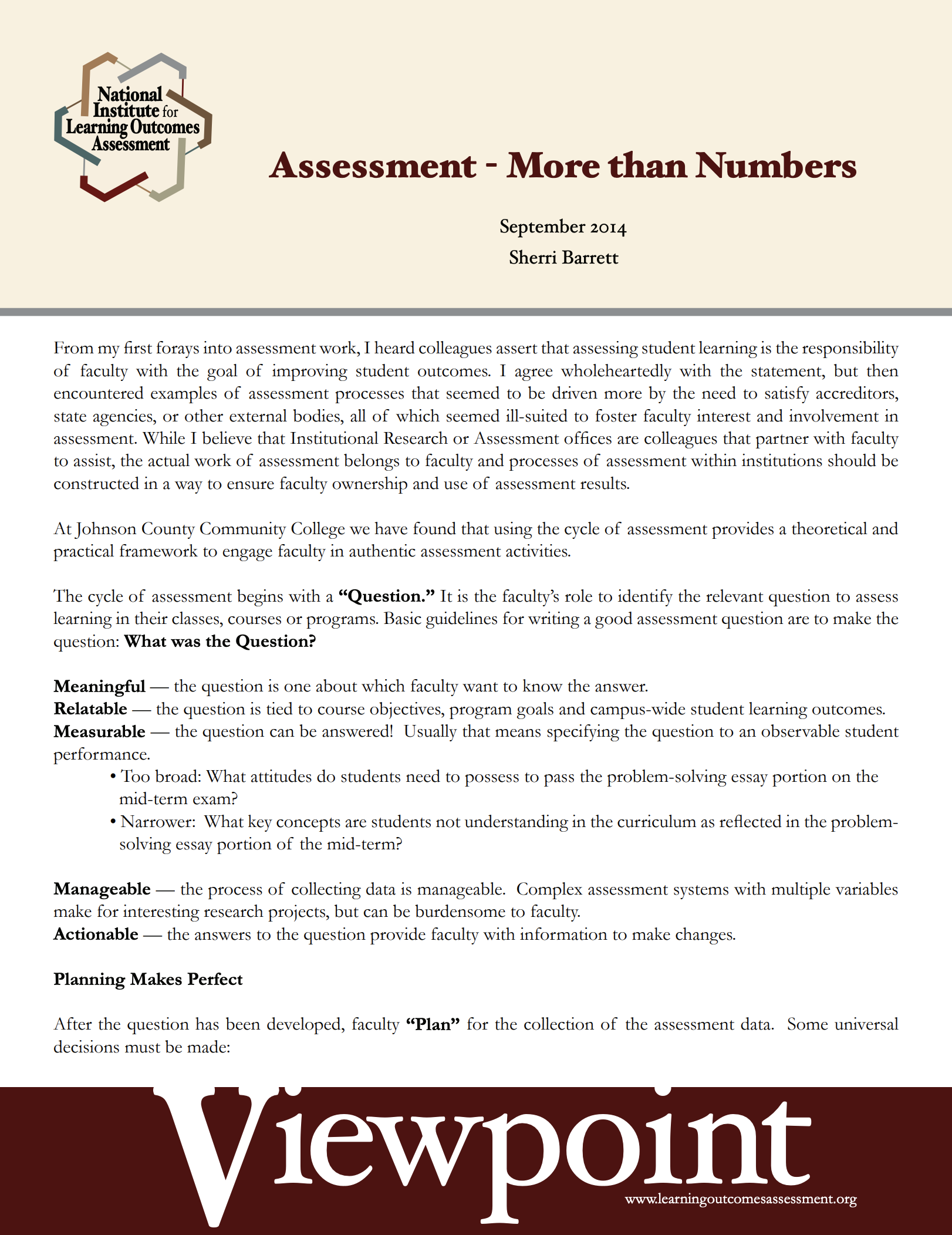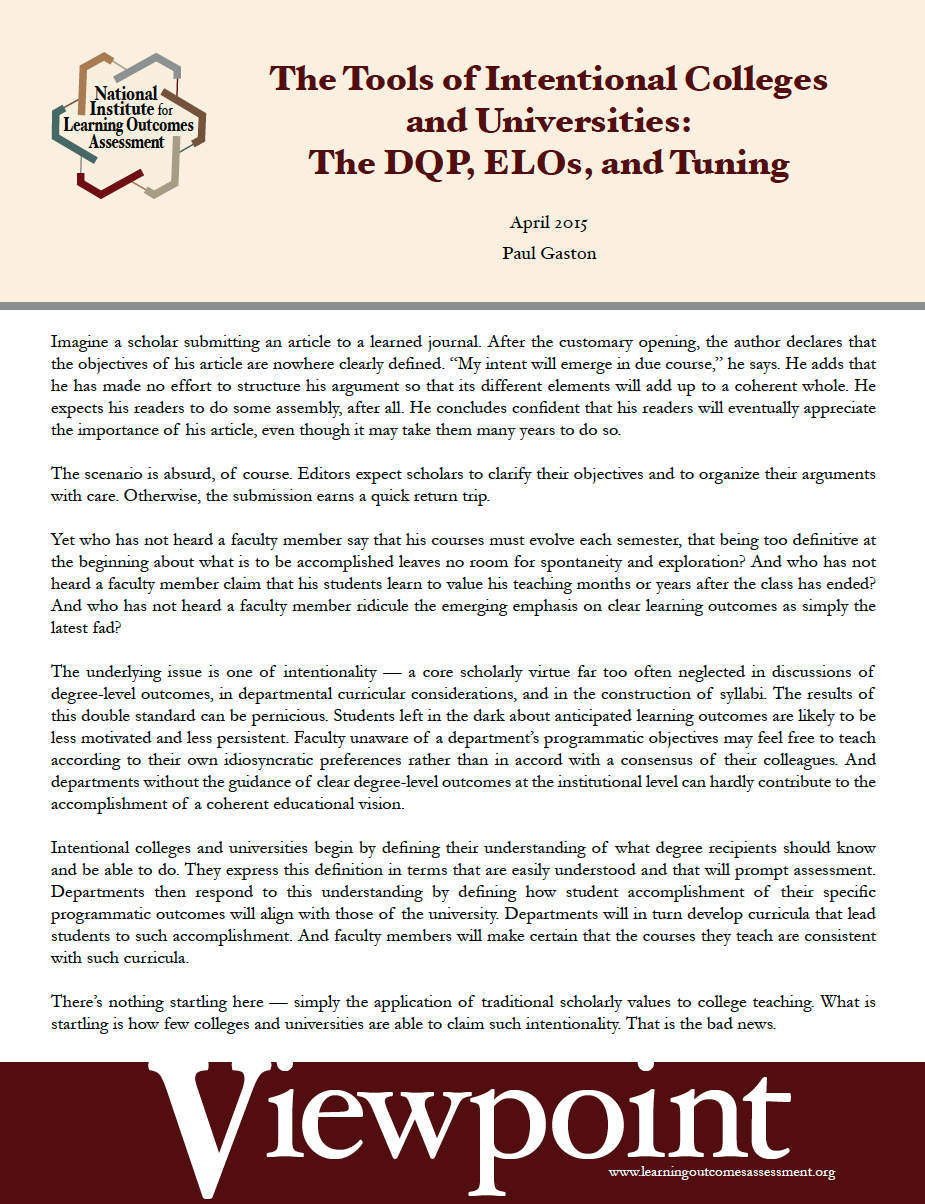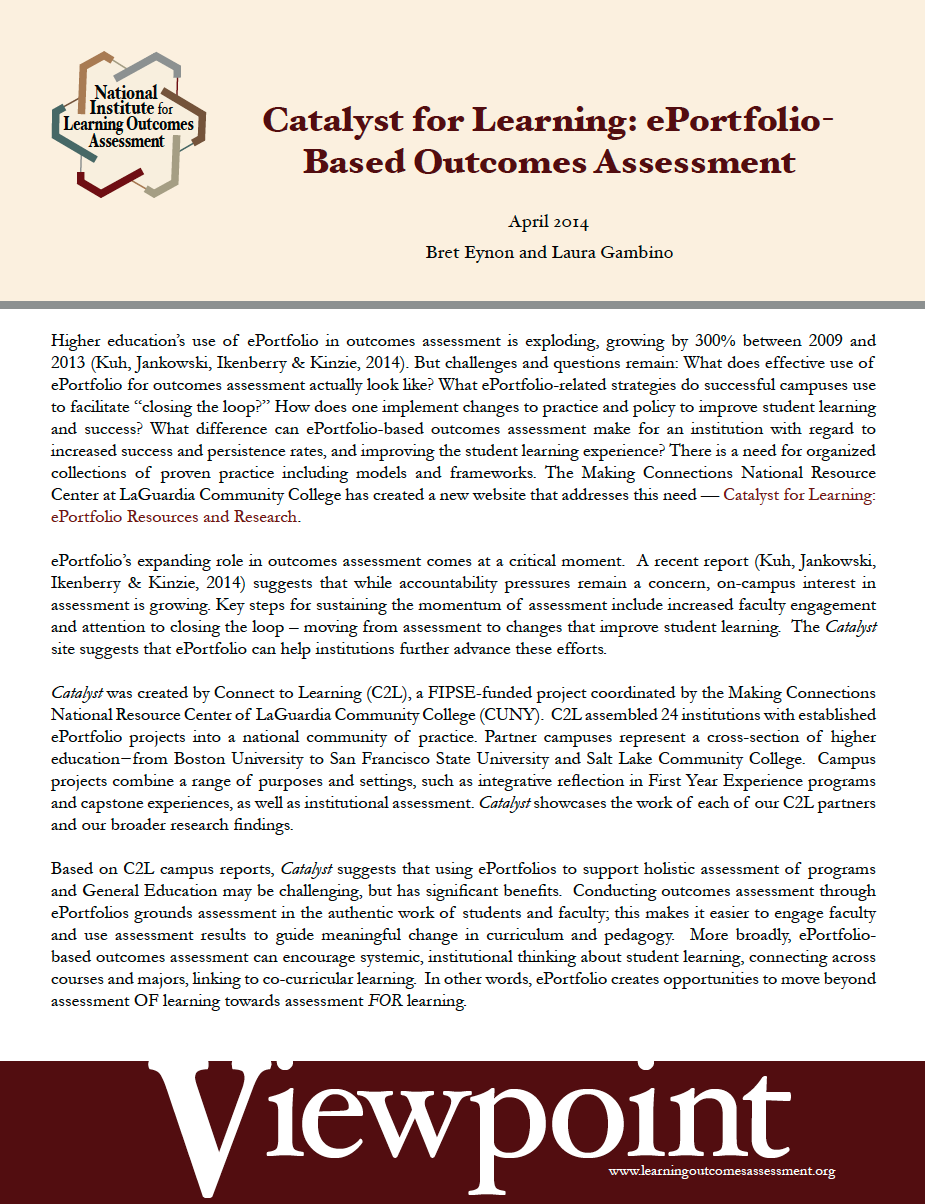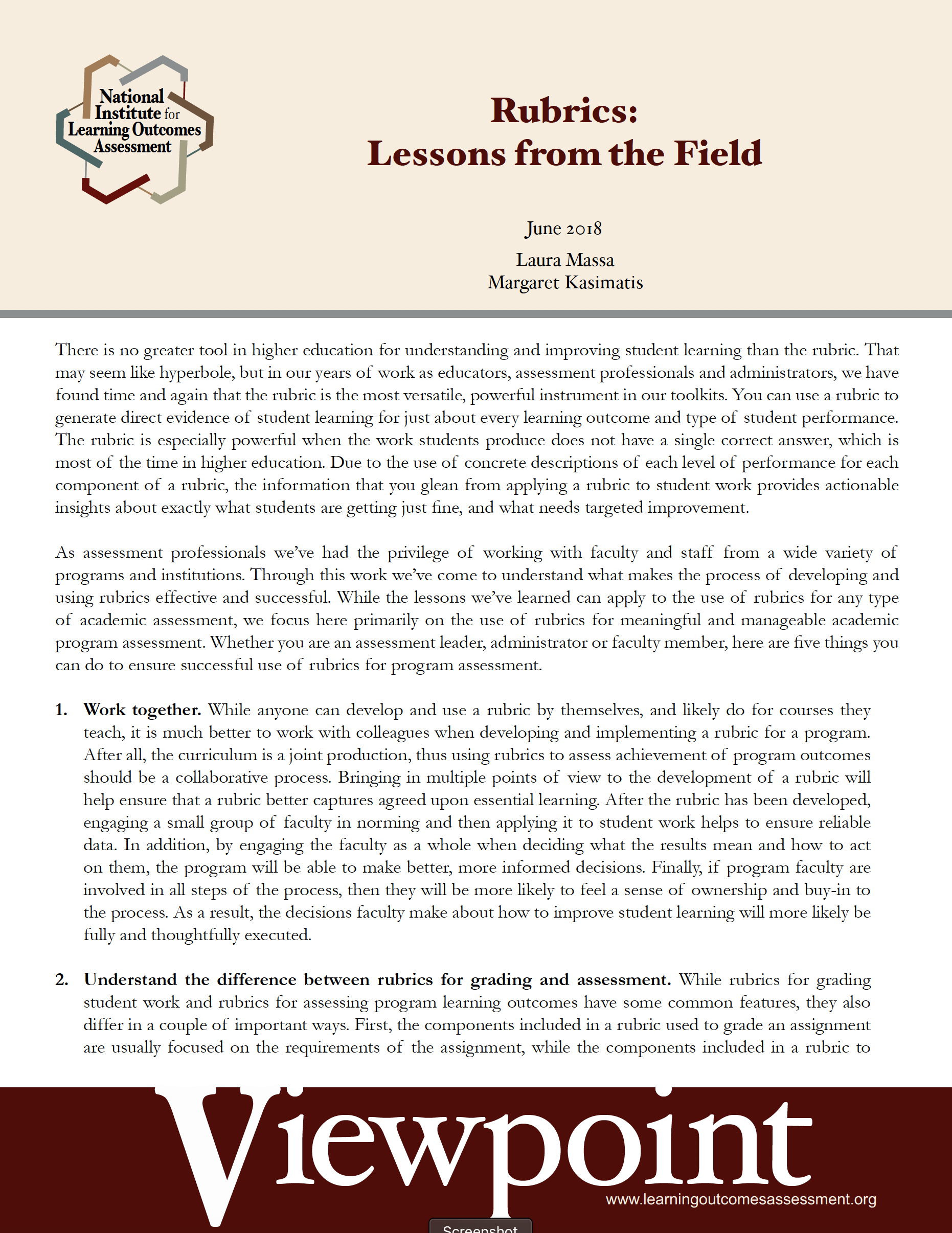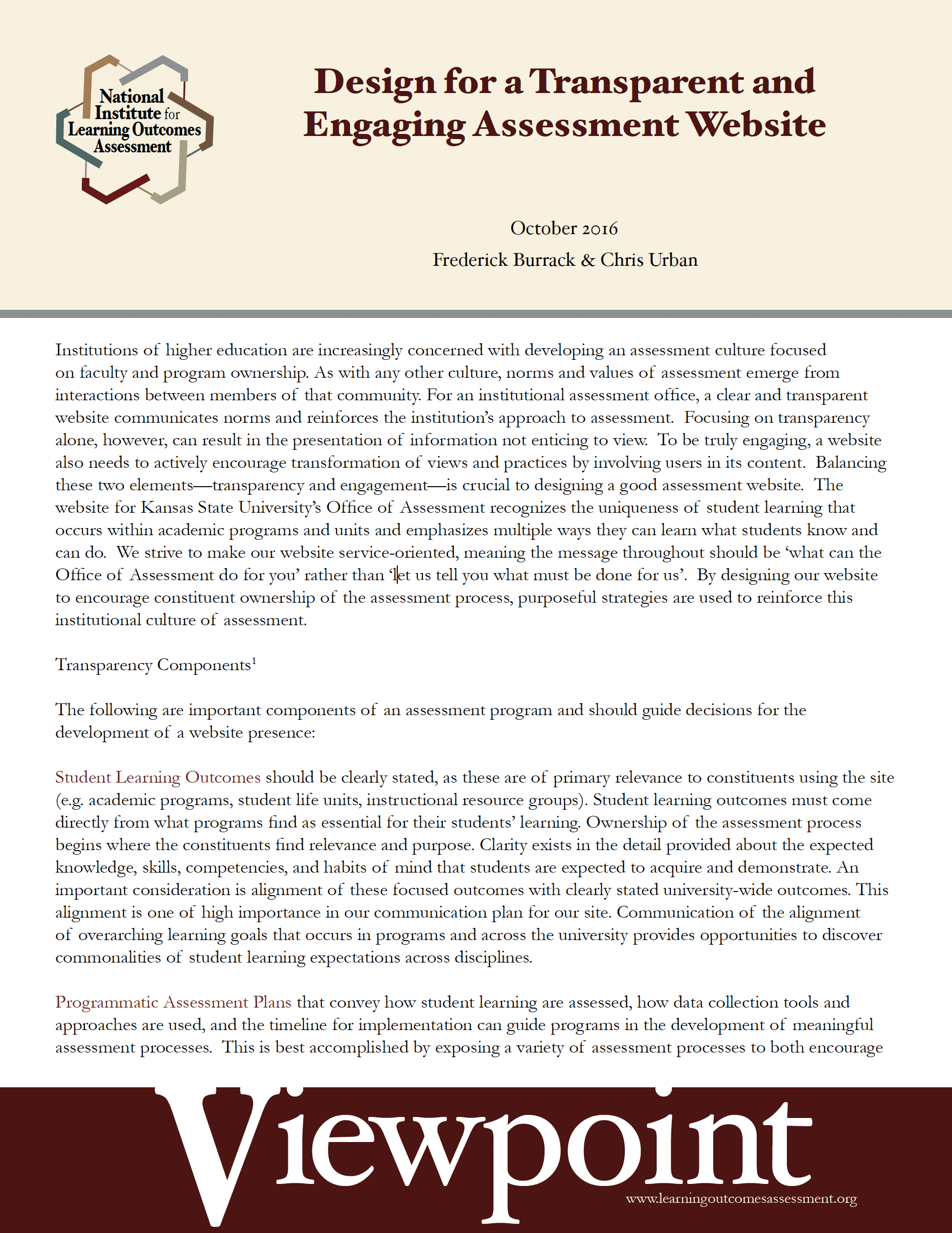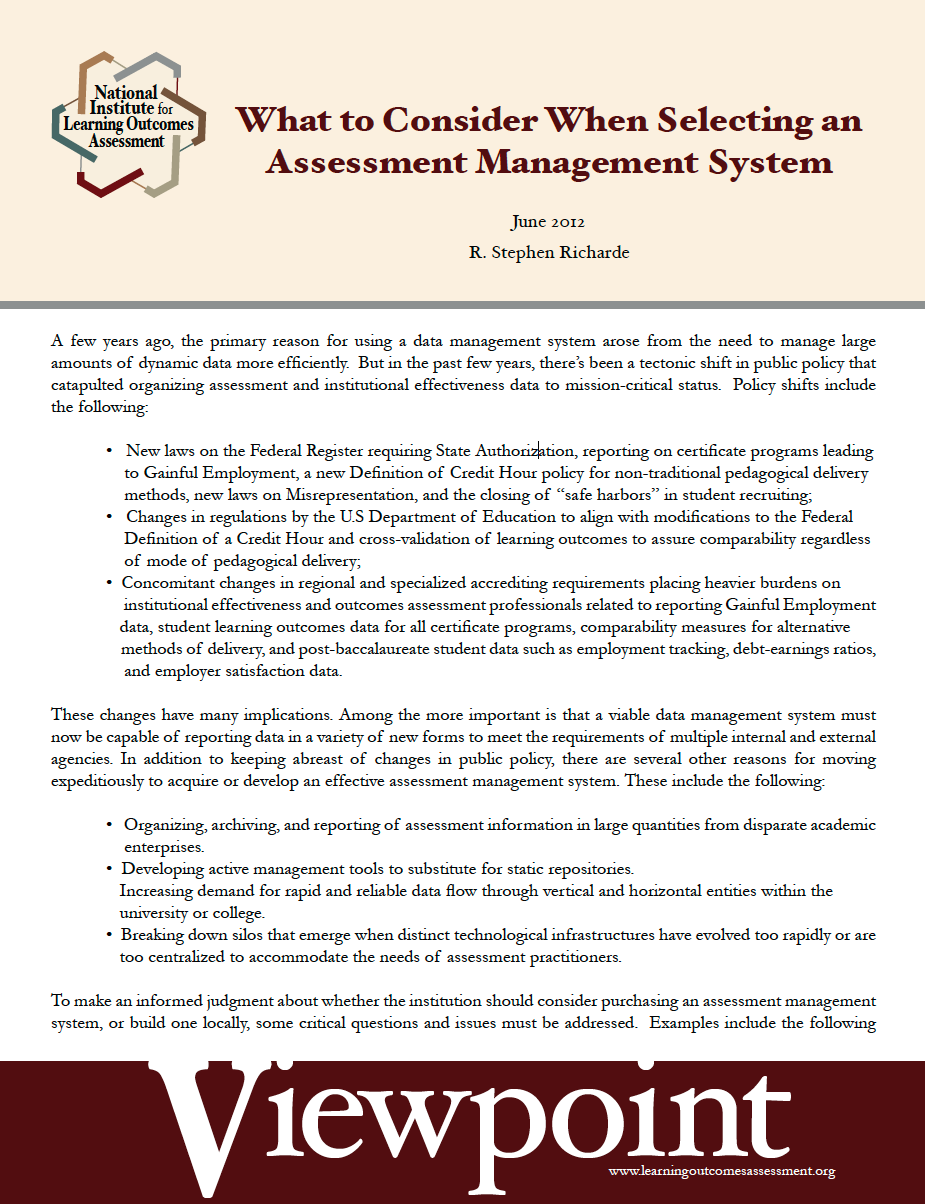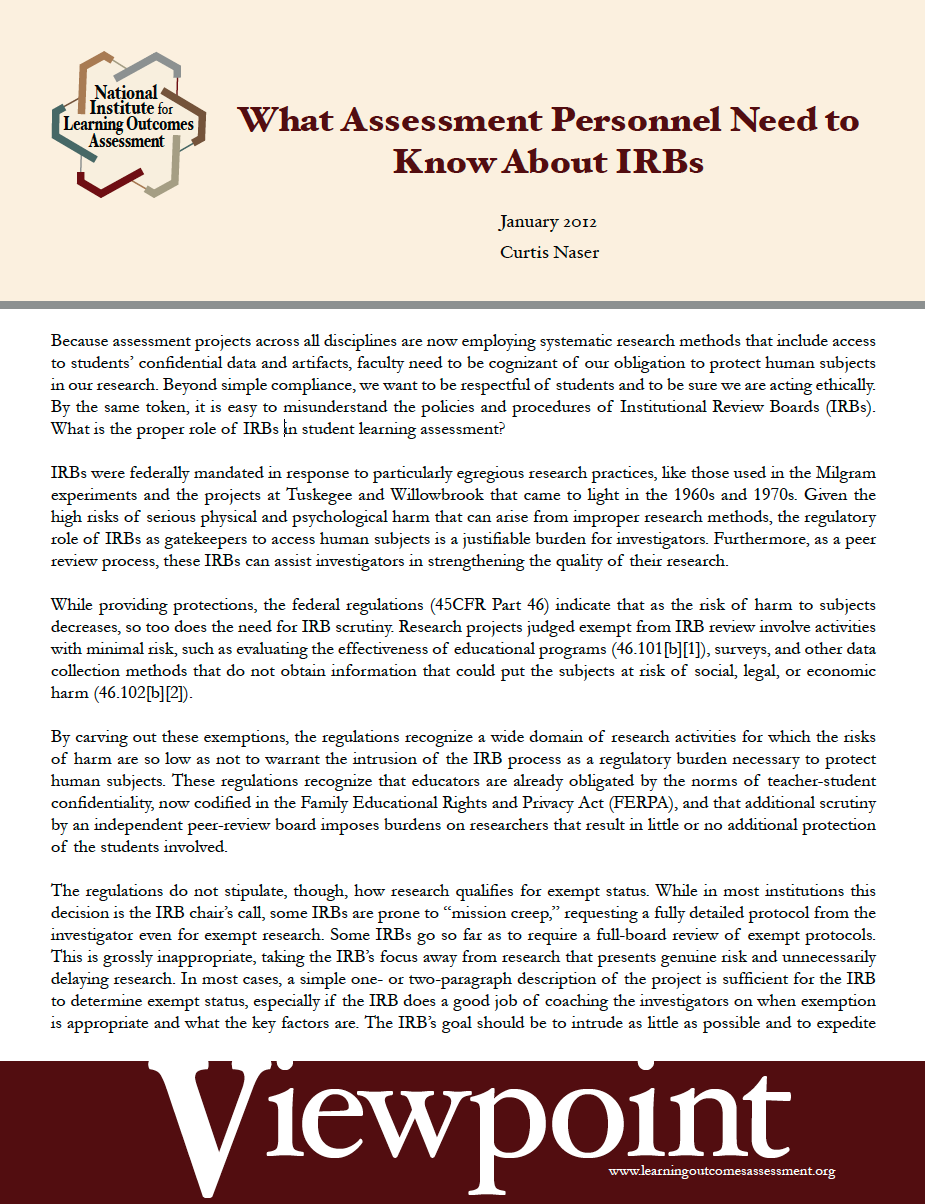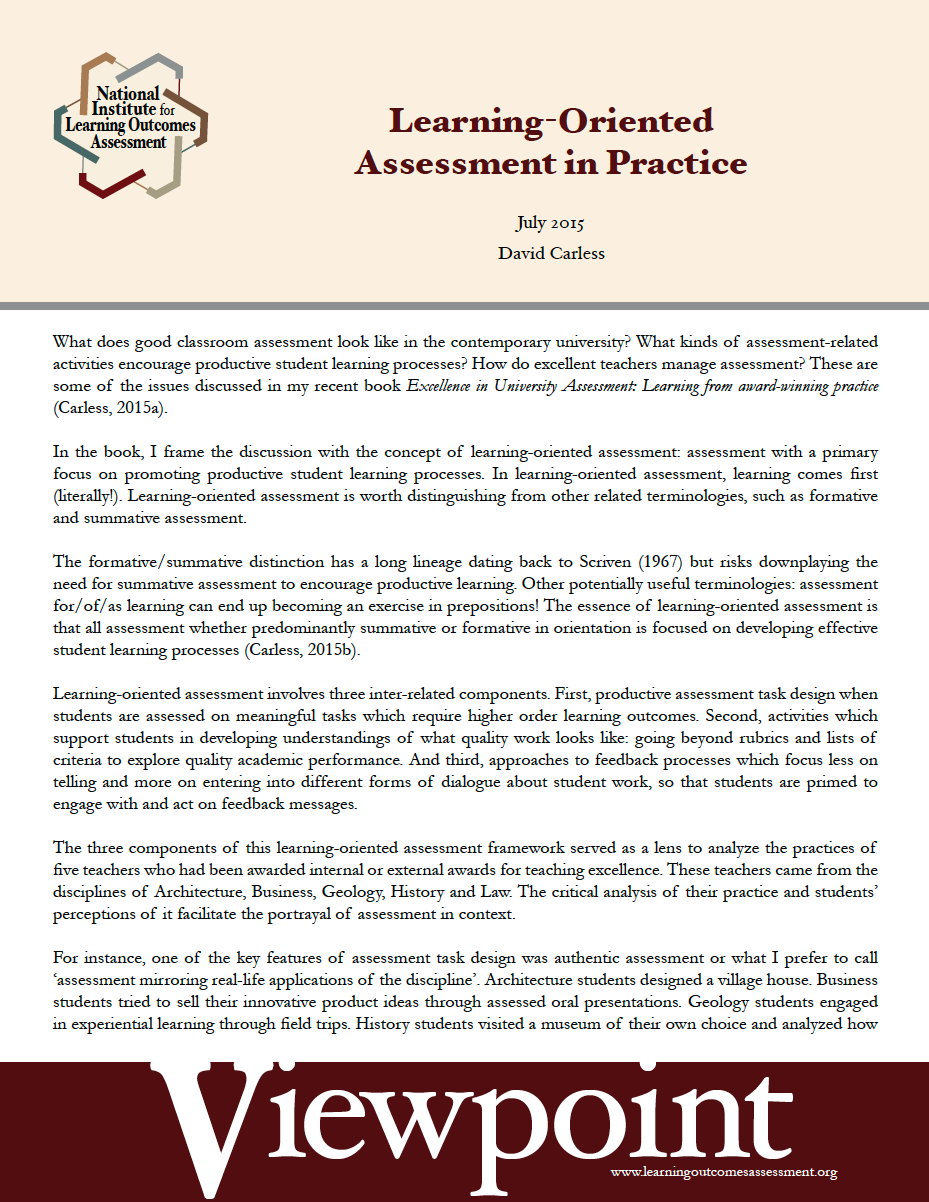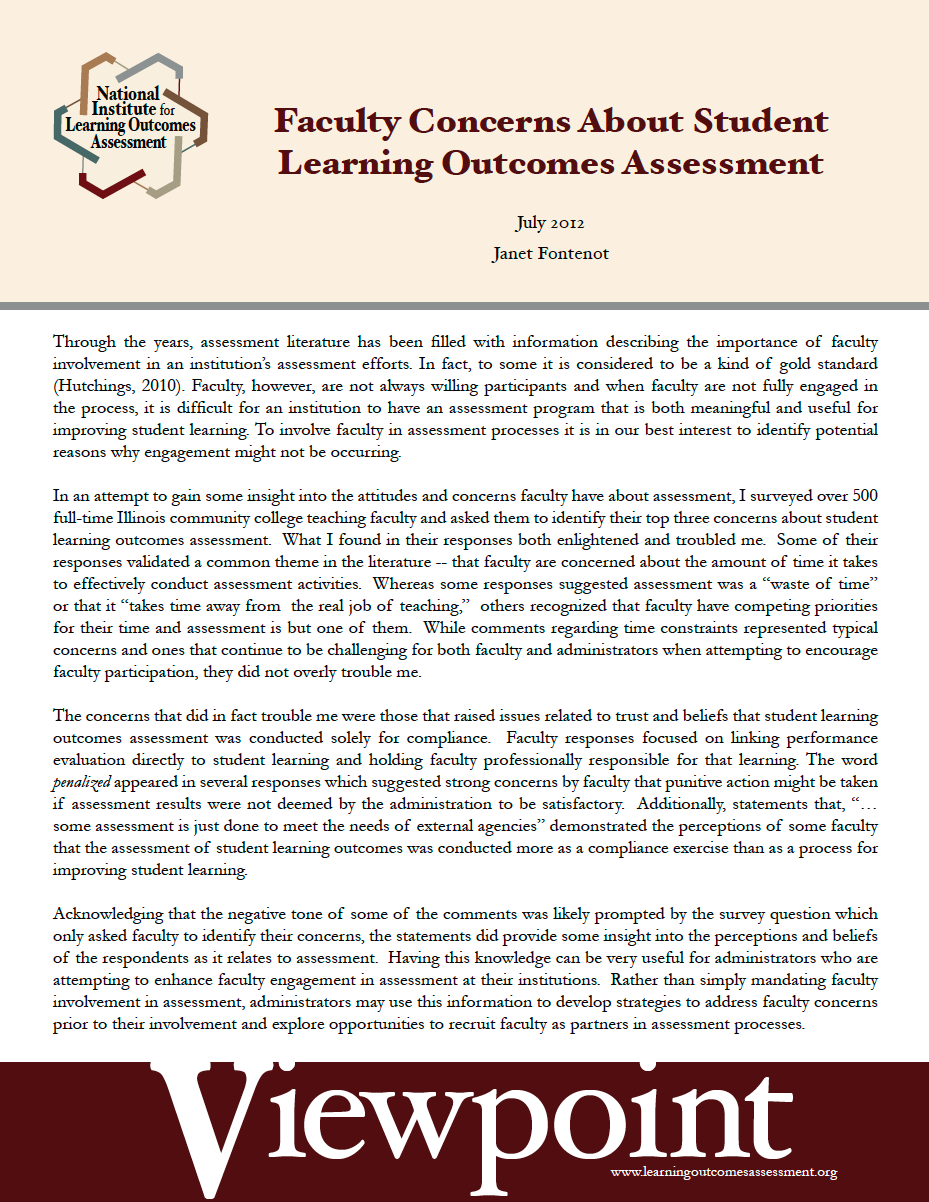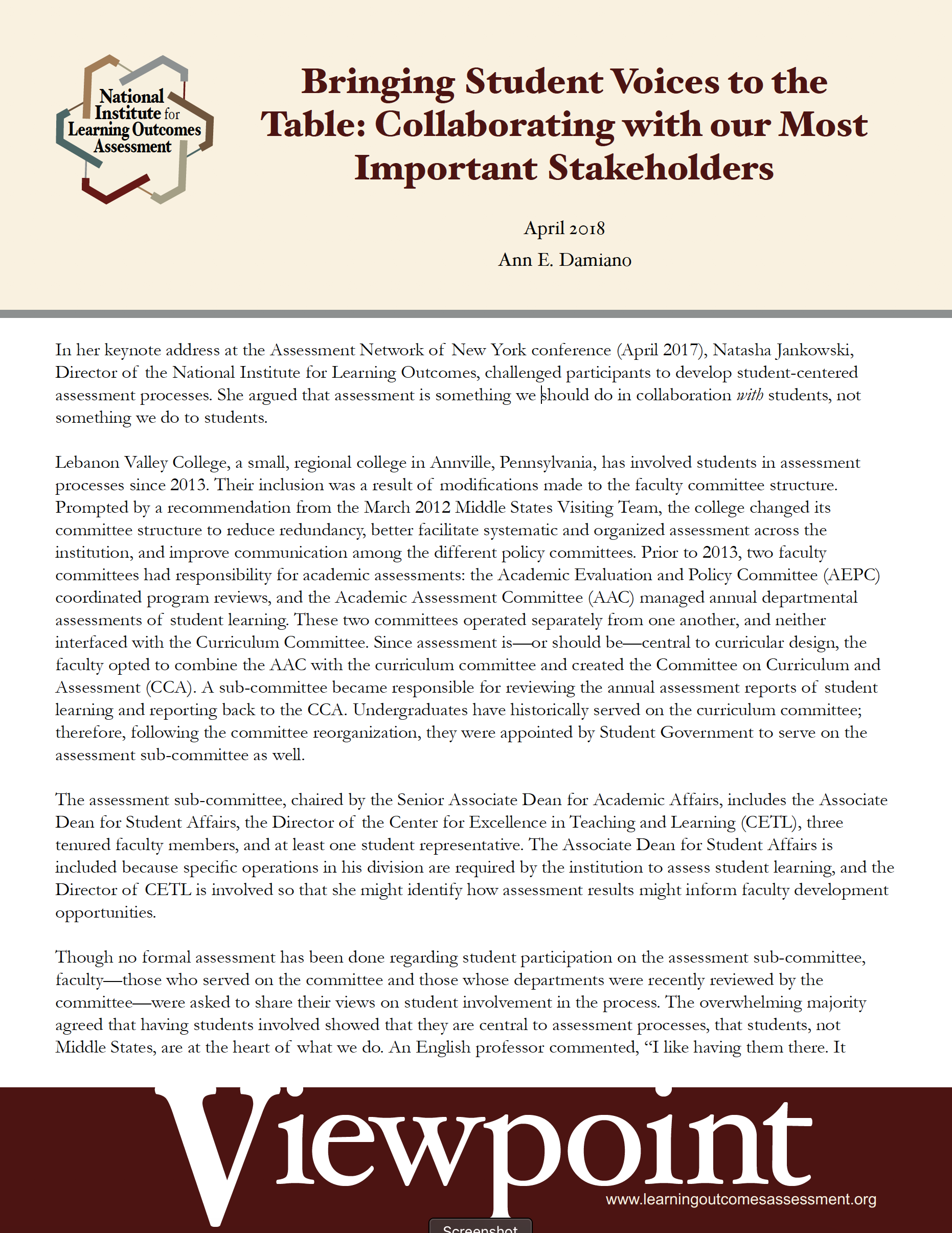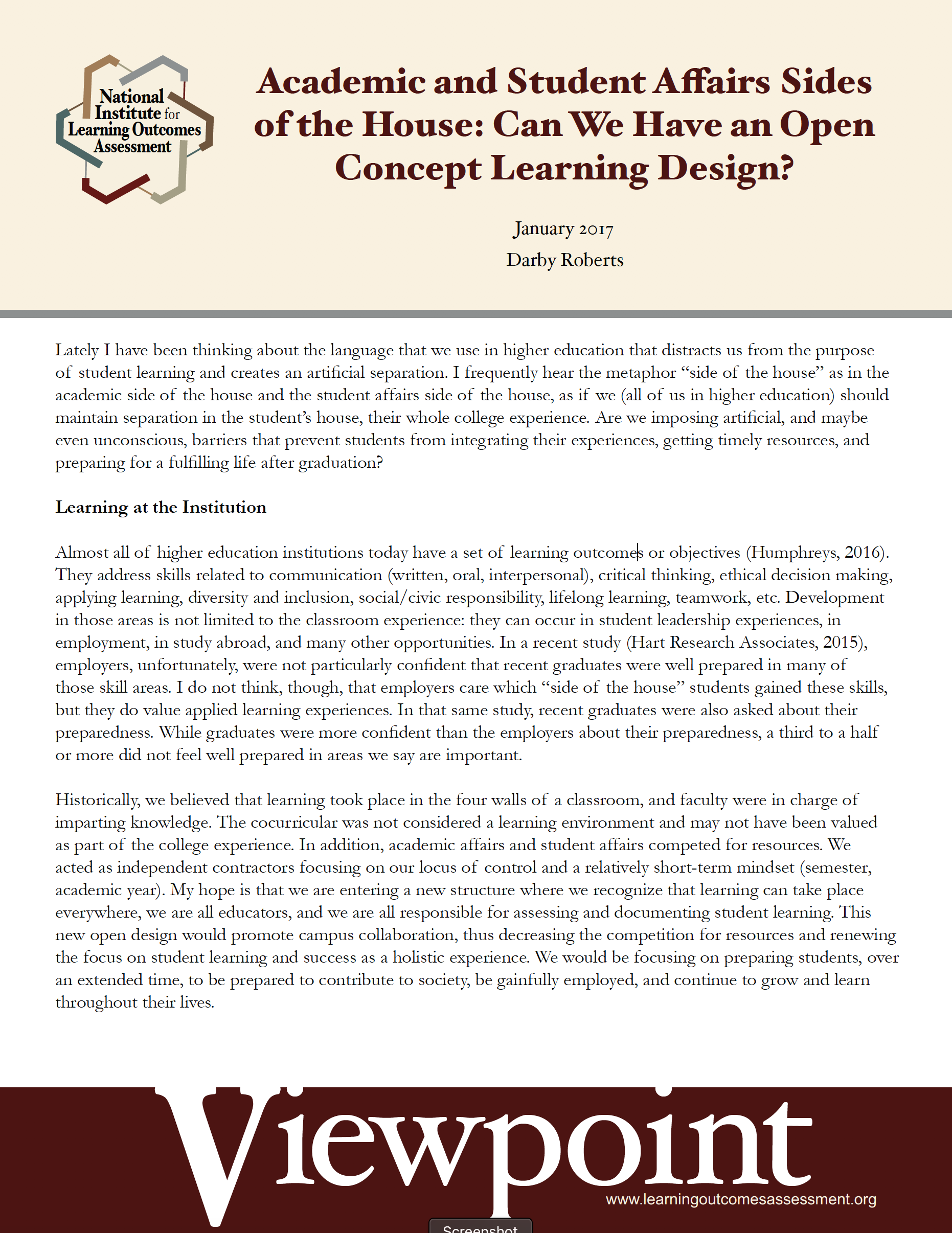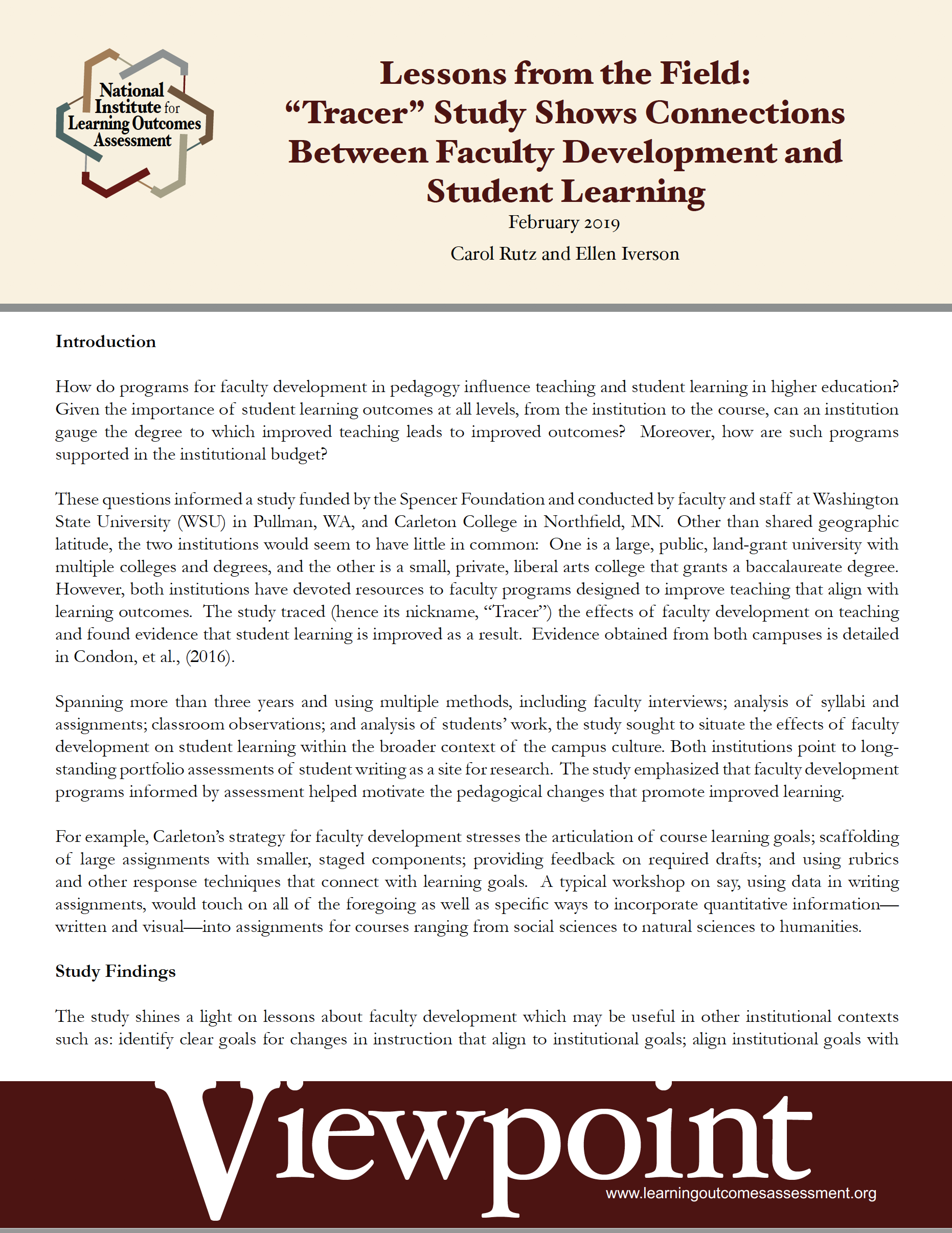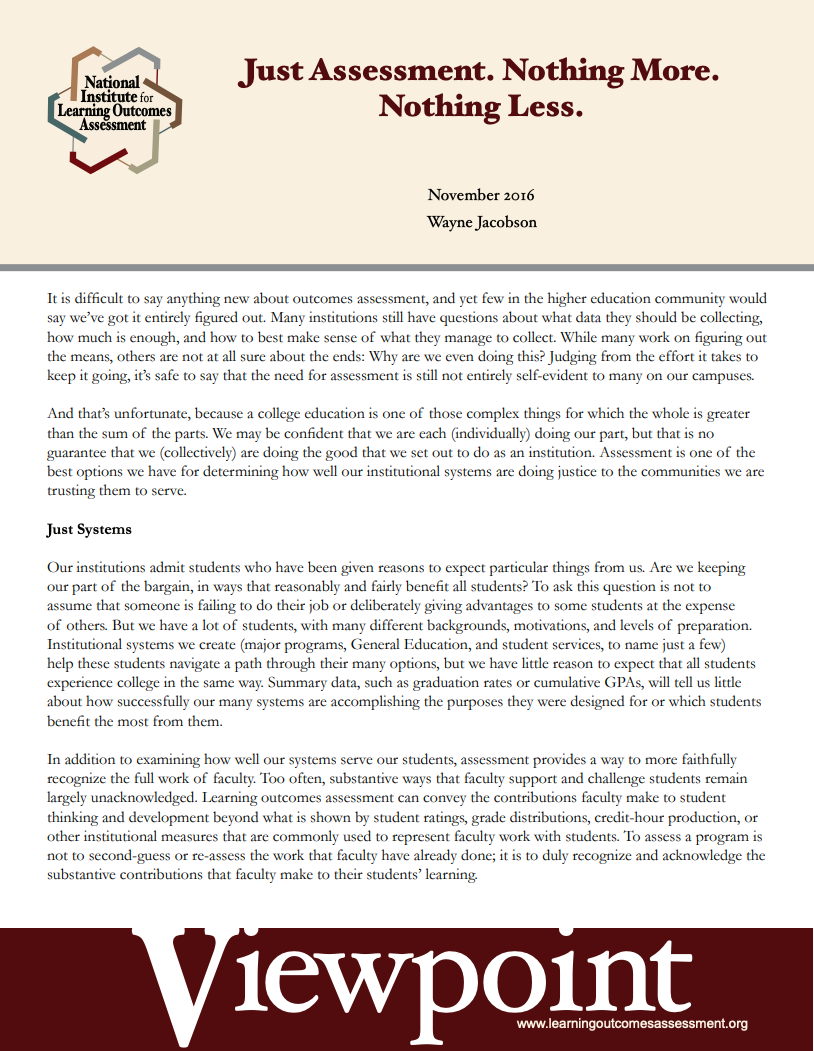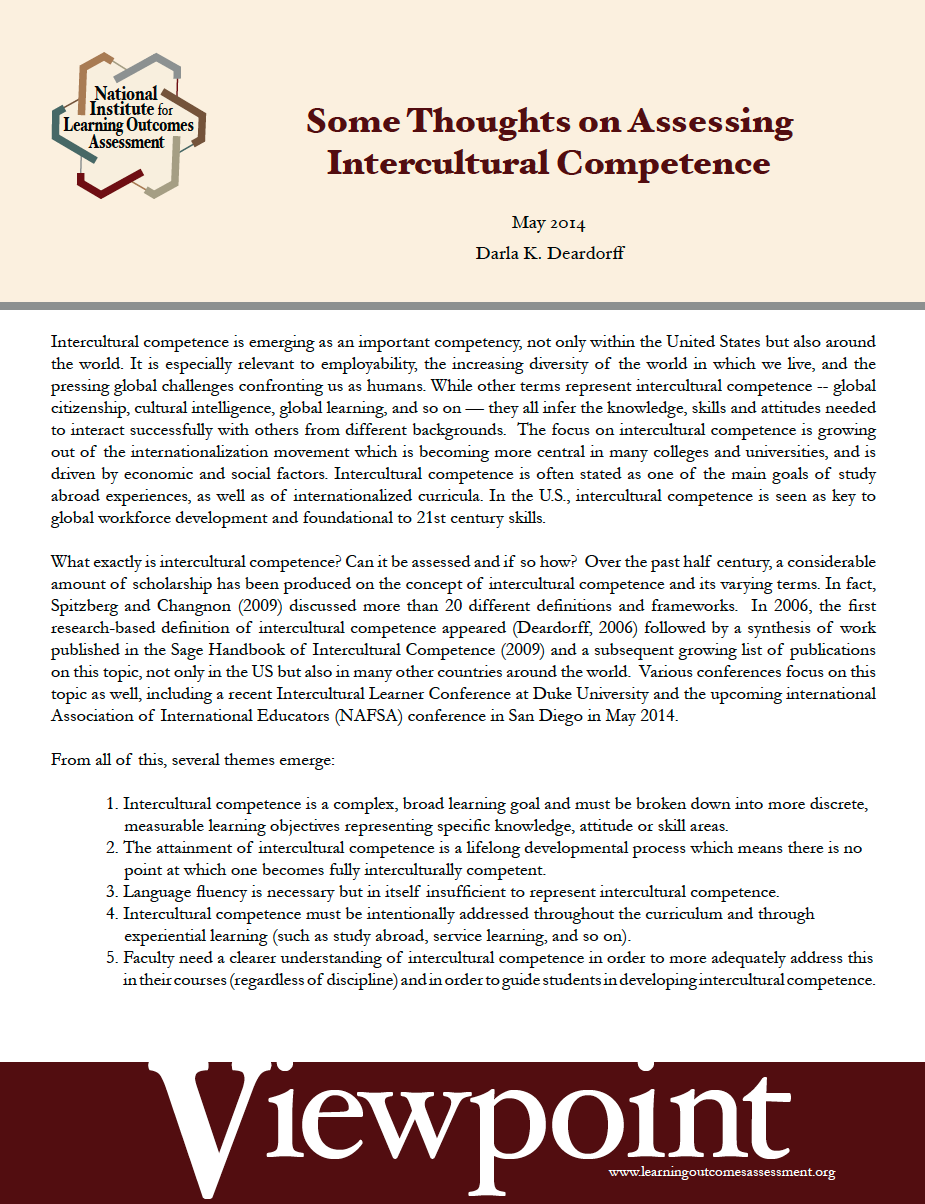
Our NILOA Viewpoints are guest-authored, thought-provoking pieces aimed at moving the field toward practices, initiatives, and questions that can inform assessment for improvement. Viewpoints cover myriad topics of interest to different audiences. To help facilitate how you navigate through these pieces, we have grouped them by topic area.
The Assessment Landscape
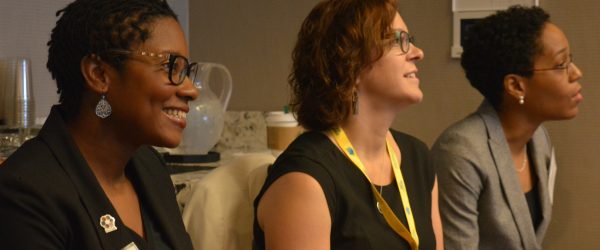
Viewpoints in this section discuss contemporary and possible future challenges and opportunities for the field of assessment, how assessment contributes to conversations surrounding the value and worth of higher education, what principles of good assessment practice we should follow, and how we can use assessment data to improve teaching and learning.
| Measuring the Quality of University Education: Beyond the Nonsense of University Rankings by Paul Ashwin |
| The EEQ Cert: A New Way to Assure and Communicate Program Quality, Relevance, & Value by Melanie Booth |
| Taking Stock of the Assessment Movement – Liberal Education, Winter, 2017 by Peter Ewell, Pat Hutchings, Jillian Kinzie, George Kuh, & Paul Lingenfelter |
| The Transformation of Higher Education in America: Understanding the Changing Landscape by Michael Bassis |
| College Ratings: What Lessons Can We Learn from Other Sectors? by Nicholas Hillman |
| Avoiding a Tragedy of the Commons in Postsecondary Education: New Opportunities for Assessment by Roger Benjamin |
| Navigating a Perfect Storm by W. Robert Connor |
| Strengths-based Assessment Practice: Constructing Our Professional Identities through Reflection by Gina B. Polychronopoulos Emilie Clucas Leaderman |
| Promoting an Improvement Culture by Claudia J. Stanny |
| Improvement Matters by Peter Felten |
| Responses to ‘The Misguided Drive to Measure Learning Outcomes‘ by Natasha Jankowski |
| AAHE Principles of Good Practice: Aging Nicely by Pat Hutchings, Peter Ewell, and Trudy Banta |
| Guidelines to Consider in Being Strategic about Assessment by Larry A. Braskamp and Mark E. Engberg |
| Why Are We Assessing? By Higher Education Assessment Practitioners |
| Ignorance is Not Bliss: Implementation Fidelity and Learning Improvement by Sara J. Finney & Kristen L. Smith |
| Using Evidence to Make a Difference by Stan Ikenberry and George Kuh |
| The Simplicity of Cycles by Mary Catharine Lennon |
| The Culture Change Imperative for Learning Assessment by Richard Hersh and Richard Keeling |
| Evidence of Student Learning: What Counts and What Matters for Improvement by Pat Hutchings, Jillian Kinzie, and George Kuh |
| Discussing the Data, Making Meaning of the Results by Anne Goodsell Love |
| Collective Wisdom: Themes from Inaugural Episodes of the Leading Improvements in Higher Education Podcast by Stephen P. Hundley & Caleb J. Keith |
| The State of Assessment of Learning Outcomes by Eduardo M. Ochoa |
Institution & Program-Level
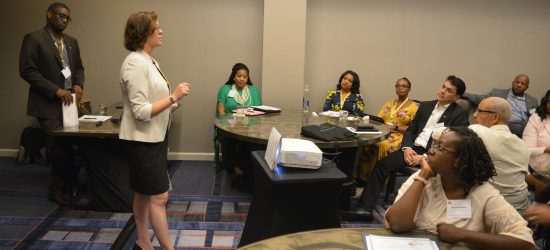
What do institutions and programs need to consider when it comes to assessment work? The Viewpoints in this section provide thoughts on implementation of assessment at various levels within institutions of higher education.
| Working Together to Define and Measure Learning in the Disciplines by Amanda Cook, Richard Arum, & Josipa Roksa |
| Challenges and Opportunities in Assessing the Capstone Experience in Australia by Nicholette Lee |
| Embedded Assessment and Evidence-Based Mapping: The Promise of Learning Analytics by Jane M. Souza |
| Assessment – More than Numbers by Sherri Barrett |
| The Interstate Passport: A New Framework for Transfer by Peter Quigley, Patricia Shea, and Robert Turner |
| The Surprisingly Useful Practice of Meta-Assessment by Keston H. Fulcher & Megan Rodgers Good |
| The Tools of Intentional Colleges and Universities: The DQP, ELOs, and Tuning by Paul Gaston |
| It is Time to Make our Academic Standards Clear by Paul E. Lingenfelter |
| The DQP and the Creation of the Transformative Education Program at St. Augustine University by Saint Augustine University |
| An “Uncommon” View of the Common Core by Paul Gaston |
| In Search for Standard of Quality by Michael Bassis |
| Eight Years On: Early and Continuing Lessons from the Tuning Project by Daniel J. McInerney |
Tools & Resources


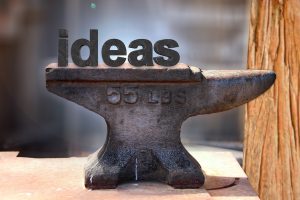
There are various tools and resources available to us in our assessment efforts. In fact, the use of multiple measures of student learning and the implementation of different tools is recommended. The Viewpoints in this section discuss processes, tools, and related concepts to consider when engaging in assessment.
| The Neuroscience of Learning and Development: How can Evidence Legitimize Self-Reflection by Marilee Bresciani Ludvik |
| Why Assess Student Learning? What the Measuring Stick Series Revealed by Gloria Shenoy |
| Comments on the Commentaries about “Seven Red Herrings” by Roger Benjamin |
| Catalyst for Learning: ePortfolio-Based Outcomes Assessment by Bret Eynon and Laura Gambino |
| Putting Myself to the Test by Ama Nyamekye |
| Ethics and Assessment: When the Test is Life Itself by Edward L. Queen |
| Ensuring Fairness in Unprecedented Times: Grading Our Nation’s Students by Tammie Cumming, M. David Miller, Jennifer Bergeron, & Fredrik deBoer |
| Rubrics: Lessons from the Field by Laura Massa Margaret Kasimatis |
| What is Satisfactory Performance? Measuring Students and Measuring Programs with Rubrics by Patricia Dewitt |
| Being Confident about Results from Rubrics by Thomas Judd, Charles Secolsky & Clayton Allen |
| Design for a Transparent and Engaging Assessment Website by Frederick Burrack & Chris Urban |
| What if the VSA Morphed into the VST? by George Kuh |
| Transparency Drives Learning at Rio Salado College by Vernon Smith |
| Making Assessment Count by Maggie Bailey |
| What to Consider When Selecting an Assessment Management System by R. Stephen Richarde |
| Demand Interoperability to Dramatically Improve the Educational Ecosystem by Jeff Grann |
| Why Student Learning Outcomes Assessment is Key to the Future of MOOCs by Wallace Boston and Jennifer Stephens Helm |
| From Uniformity to Personalization: How to Get the Most Out of Assessment by Peter Stokes |
| What Assessment Personnel Need to Know About IRBs by Curtis Naser |
| Humanizing Assessment by Amy Driscoll, Nelson Graff, Dan Shapiro, & Swarup Wood |
| Learning-Oriented Assessment in Practice by David Carless |
| Real-time Student Assessment: Prioritizing Enrolled Students Equitable Progress toward Achieving a High-Quality Degree by Peggy Maki |
| Rethinking the Role of Work in Higher Education by David W. Marshall |
| Moving Beyond Anarchy to Build a New Field by Hamish Coates |
| Learning in Partnership by Sharon B. Mader & Craig Gibson |
| Meta-Themes & Meta-Trends in Assessment: Enduring Issues, Emerging Ideas by Stephen P. Hundley & Susan Kahn |
| Direct Instruction in Learning Outcomes for More Meaningful Assessment of Students of the Environment by Jennifer Pontius & Alan McIntosh |
Stakeholder Roles
Assessment is done by groups of individuals committed to using evidence to improve teaching and learning. To see the collective impact to which we are striving, partnerships and role differentiation are crucial. The Viewpoints in this section provide insight and reflection on stakeholder roles and partnerships in assessment.
| Moving from Compliance to a Culture of Inquiry: Student Learning Outcome Implementation and Professional Development in California Community Colleges by Mary-Jo Apigo |
| Faculty Concerns About Student Learning Outcomes Assessment by Janet Fontenot |
| Addressing Assessment Fatigue by Keeping the Focus on Learning by George Kuh and Pat Hutchings |
| Getting Faculty on Board: Four Suggestions by Barbara Walvoord |
| Academic and Student Affairs Sides of the House: Can We Have an Open Concept Learning Design? By Darby Roberts |
| The Comprehensive Student Record at Dillard University by Demetrius Johnson |
| Internships: Fertile Ground for Cultivating Integrative Learning by Alan W. Grose |
| Demonstrating How Career Services Contribute to Student Learning by Julia Panke Makela & Gail Rooney |
| Student Learning Outcomes Alignment through Academic and Student Affairs Partnerships by Susan Platt & Sharlene Sayegh |
| Lessons from the Field: Tracer Study Shows Connections Between Faculty Development and Student Learning by Carol Rutz and Ellen Iverson |
| Collaborating for Individual and Institutional Success: Libraries as Strategic Campus Partners by Jennifer Duncan, Kacy Lundstrom, & Becky Thoms |
| How Assessment and Institutional Research Staff Can Help Faculty with Student Learning Outcomes Assessment by Laura Blasi |
Equity & Diversity
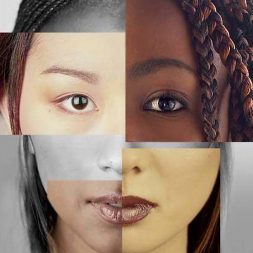
How can assessment be more equitable? How can we assess learners aptitude to understand diverse others? How can assessment support equity initiatives at our institutions? The Viewpoints in this section tackle these questions and many more as thought leaders and experts in the field offer insight on issues of equity and diversity as they relate to assessment.
| Just Assessment. Nothing More. Nothing Less. By Wayne Jacobson |
| Where is Culture in Higher Education Assessment and Evaluation? by Nora Gannon-Slater, Stafford Hood, and Thomas Schwandt |
| Helping Faculty Use Assessment Data to Provide More Equitable Learning Experiences by Mary-Ann Winkelmes |
| Some Thoughts on Assessing Intercultural Competence by Darla K. Deardorff |
| Measuring Success in Internationalization: What are Students Learning? by Madeline F. Green |
In Remembrance
Many pioneers have impacted the landscape of assessment in higher education for the better to advance the conversation toward one that situates student learning at the center of what we do. As such, these Viewpoints invite you to remember, celebrate, and reflect on the careers and lessons learned from colleagues who may have passed, but their legacies continue to teach and inspire us all.
| In Memoriam: Alexander W. Astin by Peter Ewell and George Kuh |
| In Memoriam: Arthur Wright Chickering by George D. Kuh |
| In Appreciation of Clifford Adelman by Peter T. Ewell |
| NILOA Remembers Assessment Pioneer Sister Joel Read of Alverno College by Peter Ewell, Pat Hutchings, & Russ Edgerton |

